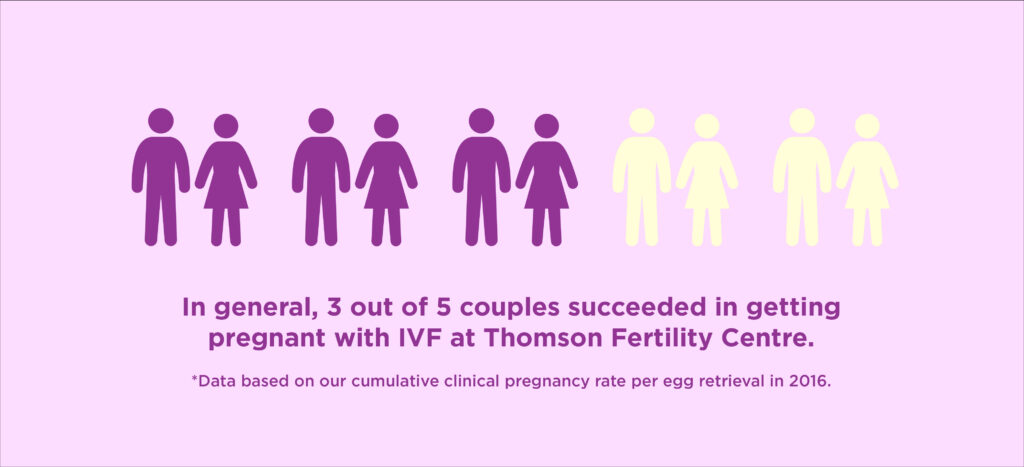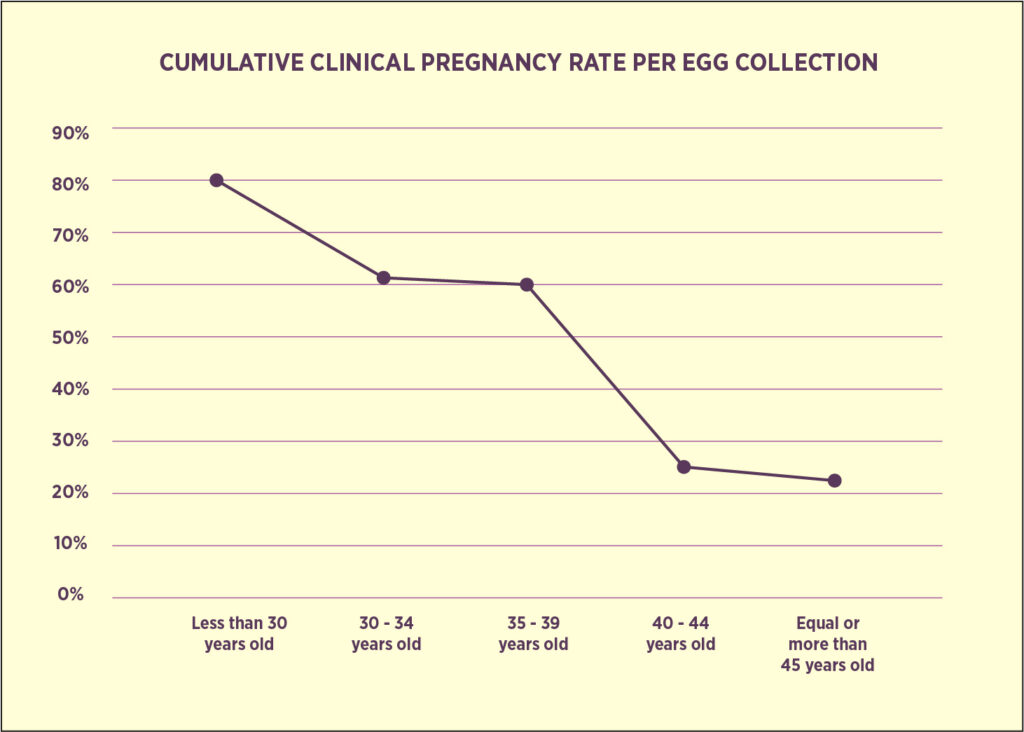Learn about your reproductive potential. Learn More >
Here’s what to expect for your fertility treatment at Thomson Fertility. Read More >
Learn about your reproductive potential. Learn More >
Here’s what to expect for your fertility treatment at Thomson Fertility. Read More >
IVF success rates around the world are calculated as either the number of clinical pregnancy rates after IVF or the number of successful live births after IVF. These two rates tend to differ quite a bit as there is unfortunately a number of miscarriages and still births that lower the success rates of live births.
IVF success rates are calculated by dividing the number of favourable results (i.e. total number of *clinical pregnancy rates or total number of **live births) by the number of procedures performed (i.e. number of embryo transfers).
Fertility clinics and hospitals publish the IVF success rates for clinical pregnancies when the number of live births for the year is not yet available. This is due to the fact that a full-term pregnancy takes 40 weeks while clinics and hospitals need to publish their outcomes before all their patients reach full term in order to give patients a regular and accurate report of IVF pregnancy rates on a yearly basis.
Naturally, you would want to know what the likelihood of you having a “take-home baby” after an IVF cycle is, so you may think the live birth IVF success rate to be more important. However, it’s worth keeping in mind that a pregnancy can fail for many reasons beyond and independent of the IVF treatment itself. Given this, considering clinical pregnancy rates when assessing a centre’s expertise can be equally valuable. Which brings us to the questions of assessing IVF success.
*Clinical pregnancies are those confirmed with a blood test and ultrasound scan, usually between 6-9 weeks.
**Live birth refers to the birth of a baby, or babies in the case of multiple births. When measuring IVF success rates, the birth of twins or triplets etc. is still counted as one live birth or delivery.

When it comes to IVF, there is no agreed standard for reporting “success”.
Outright success rates can lead to confusion when assessing an IVF centre, as the statistics can be presented in many ways. The live birth rate of an IVF centre depends on many factors of which the patient’s age, medical history and prior fertility treatment history play an important part.
Sometimes IVF success rates are quoted per complete IVF collection and treatment cycle, which can involve multiple transfers of embryos collected from one egg collection. Success rates measured this way will therefore naturally be higher than success rates measured per embryo transfer.
There are also other factors that need to be understood before you attempt to compare IVF success rates. Factors such as the patient’s age, the number of embryo transfers, and whether the process includes processes like ICSI (Intracytoplasmic Sperm Injection) or AH (Assisted Hatching) or includes frozen embryos or only “fresh” embryos can affect IVF success rates.
Therefore, it is important to compare like-for-like when looking at IVF statistics.
To learn more about the various factors affecting fertility see this page.

With data based on our cumulative clinical pregnancy rate per egg retrieval from 2016, the overall pregnancy rate with IVF at Thomson Fertility is 60%. The table below reports the clinical pregnancy success rates based on age groups—the earlier a couple starts IVF treatment, the higher the rates of pregnancy success.

In addition to age, there are many other factors that play a part in determining your likelihood of conception and live birth. So do keep in mind that these statistics are only meant as a rough reference and as such may not be reflective of your individual chances of success.
If you and your partner have difficulties in conceiving naturally, consult a fertility specialist for a couple fertility screening test to detect any possible fertility issues which could be hindering your goal.
Want to find out more about the services we provide? Do you have any questions about your particular situation or are you looking to book an appointment with one of our fertility specialists?